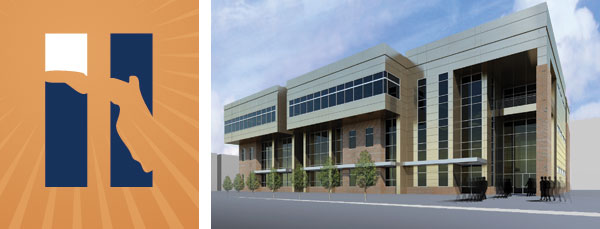Innovation Hub
By Joseph Kays
Florida Innovation Hub at UF Expected To Lead Downtown Gainesville Job Growth

Construction began in June on the Florida Innovation Hub at UF, a “super incubator” at the newly designated Innovation Square site between the university and downtown Gainesville that is designed to promote the development of new high-tech companies.
The project is being funded through an $8.2 million grant from the federal Economic Development Administration and $5 million from the university.
The 45,000-square-foot facility will nurture start-up companies in much the same way as the Sid Martin Biotech Incubator in Alachua. But the Florida Innovation Hub will also become home to the university’s main commercialization efforts. The building is scheduled for completion by December 2011.
The hub will provide technology start-up companies connected with the university with office space, laboratories, conference rooms and other capabilities. In addition, it will house UF’s Office of Technology Licensing and UF Tech Connect, the main commercialization offices for the university.
“The hub will serve as a catalyst to get innovation from university laboratories into the marketplace, where it can have an impact on the world while creating jobs in Florida,” said UF President Bernie Machen.
Programs and activities at the hub will bring together entrepreneurs, investors, students and service providers to maximize the university’s ability to create technology-based companies for purposes of commercializing more of the research conducted at UF.
“The economic downturn showed us how important it is for Florida to diversify its economy beyond tourism and agriculture,” said Win Phillips, UF’s vice president for research. “Creating this Florida Innovation Hub allows Florida to leverage UF’s massive research base for the benefit of the state as it transitions to a more innovation-based economy.”
The grant is one of the largest of its kind ever awarded by the Economic Development Administration’s Atlanta regional office, said EDA regional representative Philip T. Trader.
“We are pleased to partner on this project with the University of Florida,” Trader said. “It is exactly the type of project EDA likes to fund because of the impact it can have on helping to create jobs for the state of Florida, particularly in emerging, technology-driven sectors of the economy.”
UF is nationally recognized for its efforts to commercialize research and averages about 10 new technology-based companies each year, said Jane Muir, associate director of UF’s Office of Technology Licensing and principal author of the EDA grant proposal.
While companies located in an incubator are four times more likely to succeed than those that are not, according to the National Business Incubator Association, enhancing the incubator concept by co-locating it with the university’s main commercialization offices is a new model the university believes will yield even better results, Muir said.
“This is a super incubator,” Muir said. “By putting all the players in the same building, we expect the synergy that’s created to accelerate our ability to create companies.”
Muir added that as these companies mature in this facility and graduate into their own space nearby, they will create demand for restaurants, hotels and other businesses to serve the growing workforce.
UF’s proposal to EDA emphasized the statewide impact of the project, given the university’s strong ties to tech transfer efforts throughout the state, including partnerships with the Florida High Tech Corridor Council and Enterprise Florida.
“The Florida Innovation Hub is more than a bricks-and-mortar undertaking,” said David Day, director of the Office of Technology Licensing. “We envision this project will enable us to create numerous start-up companies that will locate in the Gainesville area as well as throughout the state.”
The project is also the anchor for Innovation Square, an ambitious plan to develop the rest of the Shands at AGH property over the next decade. Likewise, Innovation Square is viewed as an important component of the City of Gainesville’s plans for the Southwest Second Avenue corridor that connects the university with downtown.
Officials foresee mixed use for the remaining acreage, possibly including both public and commercial spaces. Plans for the new site will continue to develop over the next year, Machen said. Funding for the property’s long-term development likely will come from a variety of sources, public and private, depending on the nature of the project at hand.
Looking beyond the Innovation Hub and the surrounding property, community leaders believe the Second Avenue corridor will add a vital element to the community by creating an unbroken bridge between the UF campus and downtown Gainesville.